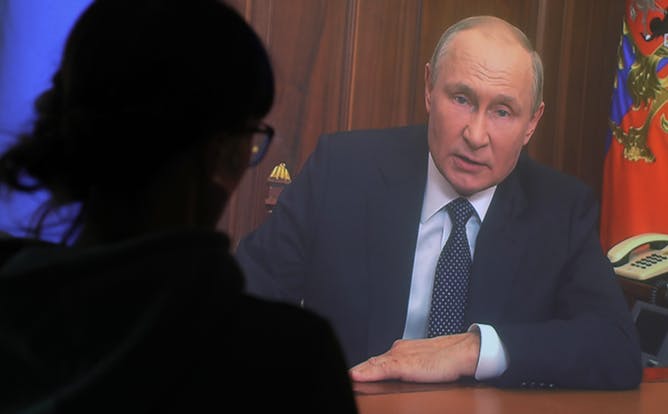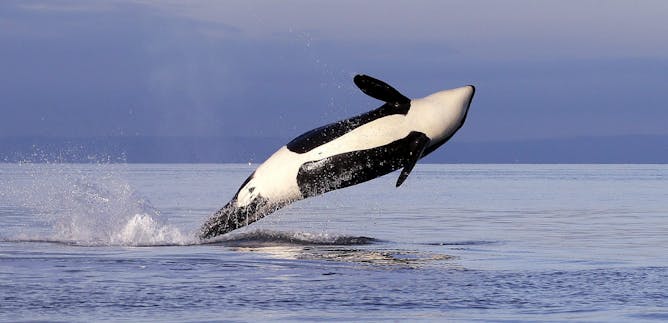|
Vladimir Putin escalated Russia’s war in Ukraine this week by announcing a partial mobilisation of the country’s reserve military and issuing a barely veiled threat to NATO countries. He also announced that referendums to join the Russian Federation would be held in the next few days in areas of Ukraine currently occupied by his troops.
Tatyana Malyarenko of the Odesa Academy of Law in Ukraine and Stefan Wolff of the University of Birmingham in the UK have put Putin’s words into context, explaining that holding spurious plebiscites of this nature has long been part of his playbook, but that in the current situation they add a huge layer of risk for all parties.
Russia’s recent setbacks on the battlefield have left Putin under pressure and increasingly isolated on the international stage, as this decision to escalate the crisis clearly indicates. You can follow all The Conversation’s coverage of the war in Ukraine here and do consider signing up for our special weekly Ukraine Recap newsletter.
|

Vladimir Putin addressed the Russian people for less than 20 minutes to outline his plan for partial mobilisation and referendums in areas held by invading Russian troops.
EPA-EFE/Maxim Shipenkov
Stefan Wolff, University of Birmingham; Tatyana Malyarenko, National University Odesa Law Academy
Vladimir Putin’s televised address to the Russian people is a desperate attempt to raise the stakes over the war in Ukraine.
|

A ‘V’ for victory for Giorgia Meloni?
Nicolò Campo/LightRocket via Getty Images
Julia Khrebtan-Hörhager, Colorado State University; Evgeniya Pyatovskaya, University of South Florida
The far-right leader of the Brothers of Italy has tried to distance the party from its fascist lineage, but many are still worried about the direction she will take the country.
|

An endangered female orca leaps from the water in Puget Sound, west of Seattle.
(AP Photo/Elaine Thompson)
Fanny Couture, University of British Columbia
The declining salmon and whale numbers raise a critical question: Is the southern resident killer whale population solely reliant on the abundance of salmon? And, if so, since when?
|
|
|
-
Danny Bradlow, University of Pretoria
The reality is that the US Federal Reserve has decided price rises must be addressed by raising interest rates. African countries have no choice by to follow suite.
-
D. Brian Blank, Mississippi State University
The Fed’s recent rate hikes are contributing to higher prices and growing recession risks around the world, yet there are good reasons why the US central bank has to keep its focus domestic.
-
Carolyn Hoyle, University of Oxford; Lucy Harry, University of Oxford; Parvais Jabbar, University of Oxford
Kenya has not carried out the death penalty since 1987, but executions could resume while the law remains on the books.
-
Svetla Ben-Itzhak, Air University
Crashing the 1,340-pound DART probe into the small moonlet orbiting the asteroid Didymos should redirect its trajectory – and could be a model for how to save Earth in the future.
-
Jean Lantz Reisz, University of Southern California
A formal legal investigation would be needed to determine whether the Florida governor and associates violated human trafficking or other laws.
-
Neil Walsh, Liverpool John Moores University
Even during periods of restricted sleep, people who report good sleep quality are three times less likely to get a respiratory infection.
-
Jacqueline Warwick, Dalhousie University
What do we love about seeing children perform? And how do their performances shape our understanding of childhood?
|
|